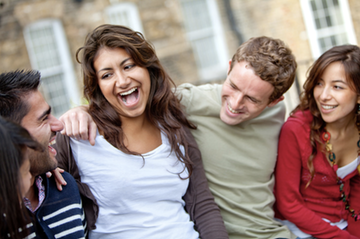Las Vegas is the friendliest place in the world. It’s like Disneyland, which is the happiest place in the world. At Disneyland, there’s no trash, no crime, no poverty, no war. Everything is perfect. You are surrounded by plastic figurines meant to resemble various creatures, mice, dogs etc. all with huge fixed smiles on their sculpted faces. Nothing fazes these guys. The world could be blowing up around them, and they’re still smiling. Happy to the end.
In Las Vegas you are surrounded by sexy, beautiful people. And they all want you. Everyone is smiling. They want to give you drinks. They want to give you free hotel rooms, free drugs. And they all want to have sex with you. When you are in Las Vegas it is clear you are the hottest man or woman alive. All those smiles and hellos. Man, these women are really into me. I must be better looking than I thought. I can have my pick of any one of those hot bodies. And best of all, it doesn’t really count. It has no impact on your life back home, on your wife or children or finances. What happens there, stays there. There are no entries in your karmic tally. That’s a beautiful thing. Right?
Las Vegas is Disneyland for the addicted set.
A young woman with a fierce cocaine addiction manages to get into rehab and puts together a couple of months of clean time. She has a good recovery plan; goes to CA meetings, and has a group of friends who are supportive. She feels pretty safe.
Her friends plan a weekend in Vegas and are persuading her to go along. She demurs. This frightens her. Her sobriety is new and fragile. She has a dealer in Vegas. She does not want to go there.
All her sober instincts tell her to stay home. But her friends persuade her it will be OK. They will be there with her. They know her problem, and will take care of her. They are her friends and will not let her down. She relents, and agrees to go. We all know how this story ends.
This young woman did manage to get clean again, but it took her 5 more years of suffering. In sobriety we need to protect ourselves from our friends as well as from our enemies. If a friend suggests to you something you know is wrong, and says, “It’ll be OK” the best answer I can think of is to say “What the fuck do you know about it”?
Often what masquerades as friendship is really narcissism, or the attempt of one addict to normalize his behavior by involving another.
Our consumerist society breeds these “friendship traps.” We are surrounded by distorted images of reality. Our screens are often just funhouse mirrors. Turn on TV and you will see endless groups of deliriously happy, impossibly attractive young people experiencing the kind of love and kinship we all long for. Everything is perfect in their lives. They feel wonderful and they always will. You too can feel like this if you drink the right soda, drive the right car, or vote for the right politician. There was a beer campaign some years back which featured a group of men bonding around various activities and beer. The tag line was “It doesn’t get any better than this.” Really? I suppose that’s true if you discount an intimate love relationship, having children, doing service, creative achievement, business success and a few other things.
Recovery involves loss, and loss creates grief. That is one reason it can be so hard. We need to experience and grieve our losses. As we recover from addiction we become gradually more invested in reality and less captivated by fantasy. In the fantasy department, the big Kahuna is the belief that we can achieve this kind of perfect love and acceptance from the outside, from others or from circumstances, when it truly has to begin inside, with self love and self acceptance.
In the friendship department, the biggest loss often is that of our best friend, our addiction. It hurts to say goodbye. But like any relationship ending, it gets easier over time, and there does come a day when we can look back at the addiction with some fondness, but mostly enormous relief and gratitude that we do not have to do that anymore.//


